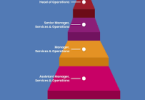Exploring Career Opportunities as a Direct Sales Agent in the Banking Sector
What Employers Are Offering
- ✔ Employer-provided health & medical insurance
- ✔ Visa sponsorship & legal work authorization
- ✔ Relocation assistance & settlement support
- ✔ Long-term employment & benefit coverage
- ✔ Permanent residency pathways (eligible roles)
Embarking on a career as a Direct Sales Agent in the dynamic and ever-evolving banking sector presents
exciting opportunities and challenges. This article explores the diverse realm of direct sales within the
banking industry, shedding light on the vital role of Direct Sales Agents and the essential skills needed to
succeed in this field. By examining the qualifications necessary to excel as a banking sales professional
and uncovering strategies for building a thriving career, this guide aims to provide valuable insights for
individuals considering or already pursuing a career in the direct sales sector of banking.
Employment Benefit Eligibility Information
Applicants searching for international employment opportunities often compare
roles offering employer-sponsored insurance coverage, relocation support,
and legally compliant work authorization programs.
- Jobs with employer-provided health insurance benefits
- Visa sponsorship positions including medical coverage
- Full-time employment with dental and vision insurance
- High salary jobs offering worker protection benefits
- Healthcare and caregiver roles including insurance coverage
Understanding benefit eligibility requirements helps applicants evaluate
qualified employment offers before submitting immigration applications.
Employers actively hiring for these roles often provide
health insurance, relocation support, and long-term benefits.
Introduction to Direct Sales Agent Role in the Banking Sector
Direct Sales Agents are vital in banking as they link customers with financial products and services. They
act as the intermediary between the bank and potential clients, assisting individuals in navigating
various banking solutions. Direct Sales Agents are the front-line representatives of a bank, responsible for
promoting and selling banking products such as loans, savings accounts, credit cards, and more. They
engage with customers personally, tailoring solutions to meet individual financial needs.
Insurance & Worker Protection Requirements
Before visa approval, many employer-sponsored programs require proof of valid
health insurance coverage and worker protection compliance. Immigration
authorities verify medical coverage eligibility before granting work authorization.
Depending on the destination country, foreign employees may also need workplace
injury protection, employer liability coverage, and travel medical insurance during relocation.
- Mandatory health insurance for visa holders
- Workplace accident and employer liability protection
- Travel and relocation medical coverage
- Insurance verification during immigration processing
Confirm insurance compliance requirements before submitting a work permit application.
Importance of Direct Sales Agents in the Banking Sector
Direct Sales Agents (DSAs) play a crucial role in the banking sector for several reasons:
- DSAs help banks reach a wider customer base, including remote and undeserved areas, expanding the market and accessing new customer segments.
- They are crucial in acquiring new customers by actively engaging prospects, explaining banking products, and assisting with the on-boarding process.
- DSAs significantly boost bank sales by utilizing incentives to meet and exceed sales targets.
- They play a key role in building and maintaining customer relationships through personalized support, quick issue resolution, and fostering loyalty and retention via direct communication.
- DSAs collect valuable market insights through daily interactions, providing banks with critical information about customer preferences, market trends, and competitor strategies.
- They offer flexibility in responding to market changes and customer needs quickly, providing banks with real-time information to make strategic adjustments and stay competitive in the banking industry.
- DSAs ensure compliance with regulatory guidelines and banking policies while attracting clients, minimizing risks associated with client acquisition, and maintaining adherence to regulations.
Qualifications and Skills Required for Direct Sales Agent Role in Banking Sector
To excel as a Direct Sales Agent in the banking sector, specific qualifications and skills are essential to
navigate the dynamic and competitive financial environment effectively.
- A bachelor’s degree in business, finance, economics, marketing, or a similar field is often preferred.
- Essential understanding of banking products and services
- Strong sales abilities
- Excellent customer service skills
- Effective communication skills
- Strong networking capabilities
- Solid financial understanding
- Goal-driven mindset
- Proficient problem-solving skills
- High ethical standards
- Proficiency with technology
- Adaptability to change
- In-depth product knowledge
- Commitment to ethics and compliance
- Ability to work well in a team
Advantages of Direct Sales Agent Role in a Banking Sector
The direct sales agent (DSA) plays a vital role in customer acquisition and sales strategies in the banking
industry. Here are some advantages of DSA in banking.
- DSAs enable banks to reach customers in locations or markets beyond the reach of traditional branches, significantly expanding their customer base.
- Employing DSAs is cost-effective compared to establishing and maintaining physical branches everywhere, as DSAs operate with performance-based incentives, making this approach economically viable for banks.
- DSAs focus on specific products or customer segments, allowing banks to leverage their expertise in targeted marketing and sales efforts.
- DSAs offer banks a flexible workforce that can adapt to changing market conditions and business needs, helping banks operate at a lower cost.
- DSAs build personal relationships with customers, delivering tailored service and advice that enhance customer loyalty and satisfaction.
- They identify and capitalize on cross-selling opportunities by offering additional banking products or services to existing customers.
- As front-line representatives, DSAs provide valuable insights into customer needs, market trends, and competitor activities, helping banks optimize their products and strategies.
Challenges Faced by Direct Sales Agents in a Banking Sector
Direct sales agents (DSAs) in the banking industry face many challenges, which can significantly impact
their effectiveness and success. Here are some common challenges:
- DSAs face intense pressure to meet stringent sales targets set by banks, which can lead to stress, complex sales strategies, and potential issues with customer service quality.
- They must navigate strict banking regulations to ensure compliance with guidelines on customer information, disclosure, and fair sales practices.
- Building customer trust in financial services is crucial, yet DSAs often encounter challenges due to consumer skepticism about financial products and concerns about misinformation.
- DSAs need comprehensive knowledge of banking products to effectively explain features, benefits, and terminology. Adequate training or additional supply chain details are crucial for selling with confidence.
- In a competitive and saturated banking market, DSAs may struggle to persuade customers to switch to their offerings.
- Handling rejection is inherent in sales, but frequent rejections can lead to frustration for DSAs. Practical training and support are vital to help them cope with rejection, build resilience, and maintain morale.
Training and Development Opportunities for Direct Sales Agents
Training and development opportunities are essential for banking direct sales agents (DSAs) to improve
their skills, stay competitive, and succeed. Here are some essential training and development
opportunities:
Product Knowledge Training
Sales Techniques and Strategies
Customer Relationship Management (CRM
Soft Skills Development.
Technology Training
Compliance and Regulatory Training.
Strategies for Building a Successful Career in Direct Sales in Banking
Building a successful business in direct sales at the bank requires several vital strategies:
- Manage detailed information about banking products and clearly explain the benefits and features to customers.
- Cultivate strong interpersonal skills to overcome customer skepticism and build trust.
- Keep up-to-date with new banking products and industry trends through continuous training and education.
- Develop clear and persuasive communication skills to effectively convey the value of banking products to potential customers.
- Build resilience to handle rejection and setbacks, and seek support and training to manage these challenges effectively.
- Utilize reliable technology and infrastructure to streamline processes, manage leads, and provide excellent customer service.
- Find ways to stand out from competitors by offering specialized expertise, personalized service, or unique marketing propositions.
Leveraging Technology and Networking in Direct Sales
Technology and communications can dramatically improve direct sales agent (DSA) performance and
success in the banking industry. Here are the basic techniques:
Customer Relationship Management (CRM) Systems: CRM systems organize customer data, track
transactions, and manage leads effectively. This enables proper follow-up and fosters customer
relationships.
Digital communication tools: Use email marketing platforms, social media, and messaging apps to
connect with prospects and customers. This allows for timely communication and leadership training.
Data Analytics: Use data analytics tools to analyze customer behaviour, identify trends, and adjust sales
strategies accordingly. This data-driven approach helps improve conversion rates by targeting the right
audience.
Virtual meetings and presentations: Conduct virtual meetings and presentations using video
conferencing tools. This allows DSAs to reach customers regardless of location, saving time and
maximizing reach.
Online Sales Platforms: Use online platforms and portals to manage applications, provide product
information, and facilitate communication. This streamlines the sales process and makes it more
convenient for the customer.
Networking Sessions and Webinars: Attend industry networking events and seminars to expand your
professional network and stay abreast of industry trends. Networking helps build relationships and
generate referrals.
Conclusion
The Direct Sales Agent is essential in the banking industry, playing a crucial role in expanding business
and engaging with customers. This position offers numerous opportunities for personal and professional
growth. By utilizing the strategies, skills, and opportunities outlined in this article, individuals looking to
succeed in direct sales banking positions can effectively overcome challenges and create a successful
and rewarding career in this dynamic field.






